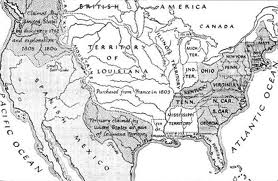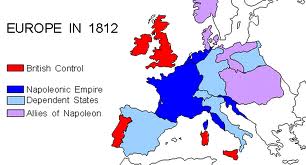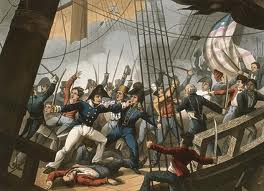The Texicans
 Thursday, February 23, 2012 at 6:00AM
Thursday, February 23, 2012 at 6:00AM 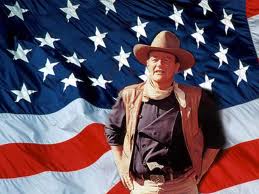 I remember a discussion on a forum I frequent about America's wars. I mentioned the War with Mexico as an example of a war based on the desire to steal land. I thought that maybe everyone would see that this was a bad war based on greed. I was wrong. While I did not find the defense that war received very coherent, a defense was made. Ultimately the defense seems to be the same one John Wayne gave in his infamous Playboy interview for the way we treated the Indians: "We needed the land, and the Indians selfishly wanted to keep it for themselves." (While I have not found a good reference for this, there are enough secondary references that I think he did say this.)
I remember a discussion on a forum I frequent about America's wars. I mentioned the War with Mexico as an example of a war based on the desire to steal land. I thought that maybe everyone would see that this was a bad war based on greed. I was wrong. While I did not find the defense that war received very coherent, a defense was made. Ultimately the defense seems to be the same one John Wayne gave in his infamous Playboy interview for the way we treated the Indians: "We needed the land, and the Indians selfishly wanted to keep it for themselves." (While I have not found a good reference for this, there are enough secondary references that I think he did say this.)
Before we can discuss the War with Mexico, we need to discuss the Revolution of Texas.
The movie that John Wayne starred in and directed naturally comes to mind in the context of the War with Mexico. That movie was The Alamo. As is natural in such propaganda efforts, the Mexicans were portrayed as evil. (It should be pointed out that Wayne married three Hispanic women.)
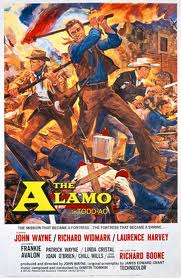 Here is what John Wayne's character said about the war:
Here is what John Wayne's character said about the war:
“I may sound like a bible beater yelling up a revival at a river crossing camp meeting but that don’t change the truth none, there’s right and there’s wrong. You gotta do one or the other. You do the one and you’re living, you do the other and you may be walking around but you’re dead as a beaver hat.”
- Col. Davy Crockett in The Alamo 1960, directed by John Wayne
Why did the Texicans throw off Mexican rule? No doubt the fact that most of them wanted to have a system of government similar to what they had in America. Wikipedia tells us this about the war:
Animosity between the Mexican government and the settlers in Texas, including many settlers of Mexican ancestry, began with the Siete Leyes of 1835, when Mexican President and General Antonio López de Santa Anna abolished the federal Constitution of 1824 and proclaimed the more centralizing 1835 constitution in its place. The new laws were unpopular throughout Mexico, leading to secession movements and violence in several Mexican states.
There were religious elements as well.
Some American immigrants and Mexican citizens were accustomed to the rights they had in the U.S. that they did not have in Mexico. For example, Mexico did not protect Freedom of Religion, instead requiring colonists to pledge their acceptance of Roman Catholicism; Mexican Law also required a tithe paid to the Catholic Church.
John Wayne converted to Catholicism, so this aspect was not mentioned in the movie. His conversion was probably later, but all his wives were Catholic.
Another aspect that was not mentioned is that in Mexico slavery was illegal. Since there were 5000 slaves in Texas, you can see the economic aspects of the Texas revolution as well. So for good and bad reasons, Texas became independent in 1836.

The pattern we have been seeing for false flags continues in the Texas Revolution. We have a false cinematic impression of the war. Brave fighters against the evil, dark skinned foe is the meme. Important issues like slavery are ignored. While if I had been a Texican, I would have supported the revolution, hopefully I would have seen the whole picture.
As America leaves two wars and prepare to head to another war, can we see the big picture?
Saturday I will talk about the American-Mexican War.
 [Positive Dennis]
[Positive Dennis]
Todd Suave sent me the following:
Dennis,
I Googled the John Wayne quote and found this for you:
The interview is reprinted in The Playboy Intervew (Wideview Books, c1981). Here is the text of one answer about the Indians:
"I don't feel we did wrong in taking this great country away from them, if that's what you're asking. Our so-called stealing of this country from them was just a matter of survival. There were great numbers of people who needed new land, and the Indians were selfishly trying to keep it for themselves." -p.269
It is apparently available on this Playboy interview CD-ROM:
Of course John Wayne was already dead in 1981 so I have no idea when he may have said this. Since Playboy only started publishing in the early 1950s, it was obviously somewhere in that 25 year or so period. It sounds 1950-60's-ish.
Thanks Todd.
 Propaganda,
Propaganda,  War
War 